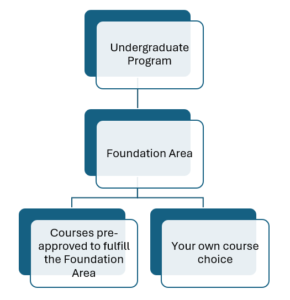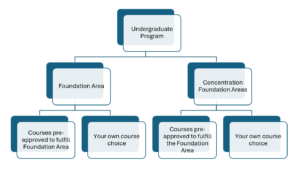Investigating Required Knowledge Foundations

This page provides general information about a learning activity that’s common in many Educational Planning courses.
Since educational planning course content depends on the mentor/advisor and the student, understand that your course may have different and/or specific expectations related to this topic.
Knowledge Foundations and Educational Planning
Understanding the knowledge foundations in your degree area and concentration is key to planning an individualized degree.

When you open up any individualized program in the list of Individualized Undergraduate Programs and look at the Program Details, you’ll see Knowledge Foundations listed. Under each foundation, you’ll see courses listed that are pre-approved to fulfill that area. However, there’s also a comment at the start of foundation list that says that you can choose a different course to fulfill the foundation, provided that course actually does address that foundation in a way that makes sense for the focus of your degree.
An individualized degree provides this type of flexibility and gives you the chance to make informed decisions about the content of your degree, to create a degree that fits your goals and interests.

Knowledge foundations for the degree area and concentration are important since they reflect, in a general way, what universities and employers expect a degree in that field to include. Think of the knowledge foundations as a way to ensure truth in packaging. For example, you cannot call a degree Business, Management, and Economics if there’s no economics course in the degree.
Some undergraduate programs also have Concentration Details which further specify broad knowledge areas that are traditionally included in a degree with a specific focus.
 Understanding how to work with knowledge foundations is key to planning your degree.
Understanding how to work with knowledge foundations is key to planning your degree.
How to Work with Knowledge Foundations
Although there are courses pre-approved to fulfill each knowledge foundation in an individualized degree, planning your degree is not always as simple as choosing one course from each category.
You need to make sure that you’re including complementary courses that create a cohesive degree and concentration.

Using Historical Studies as an example, you could create an individualized concentration in U.S. Women’s History. That’s not one of the concentrations listed in terms of concentration examples, but it’s possible to pursue.
So you’d need to understand the purpose of each knowledge foundation, which is explained before the course examples, and identify courses that fulfill that foundation.
For example, an individualized concentration in U.S. Women’s History might include:
Foundation #1 Introductory Learning
- HIST 2025 US History to 1865: What does it mean to be a Free Nation?
- HIST 2030 US History from 1865 to Present
Foundation #2 Breadth – defined in terms of time period and cultural experience
- HIST 3035 American Revolution: Women’s History
- HIST 4005 Mad Men Mad Women: History of Women in the Twentieth Century
- ARTS 4035 Images of Women in Western Civilization
Foundation #3 Diversity
- HIST 2035 Women & Work in American History
- HIST 3115 US Women’s History
Foundation #4 Links to Other Disciplines
- COMM 4015 Women, Girls, & the Media
- ECON 3040 Economics of Gender, Work, & Family
Foundation #5 Independent Inquiry, Research, & Analysis
- HIST 3272 History of American Families & Children: Advanced
- HIST 3245 Historiography & Methods
As you can see from this example, the knowledge foundations are there to help guide your course choices so even though you’re creating a unique concentration, you are still including foundational knowledge expected in any historical studies degree.
Key Takeaway – You don’t do this alone

You work with your mentor/advisor in an educational planning course to understand knowledge foundations for your degree and concentration, and how you might both fulfill and individualize them as you plan your degree.
Key Takeaway – Looking Forward
You will eventually explain your course choices – how they fulfill the required knowledge foundations for your degree and/or how they create a coherent focus in your degree – in the rationale essay that accompanies your degree plan.
